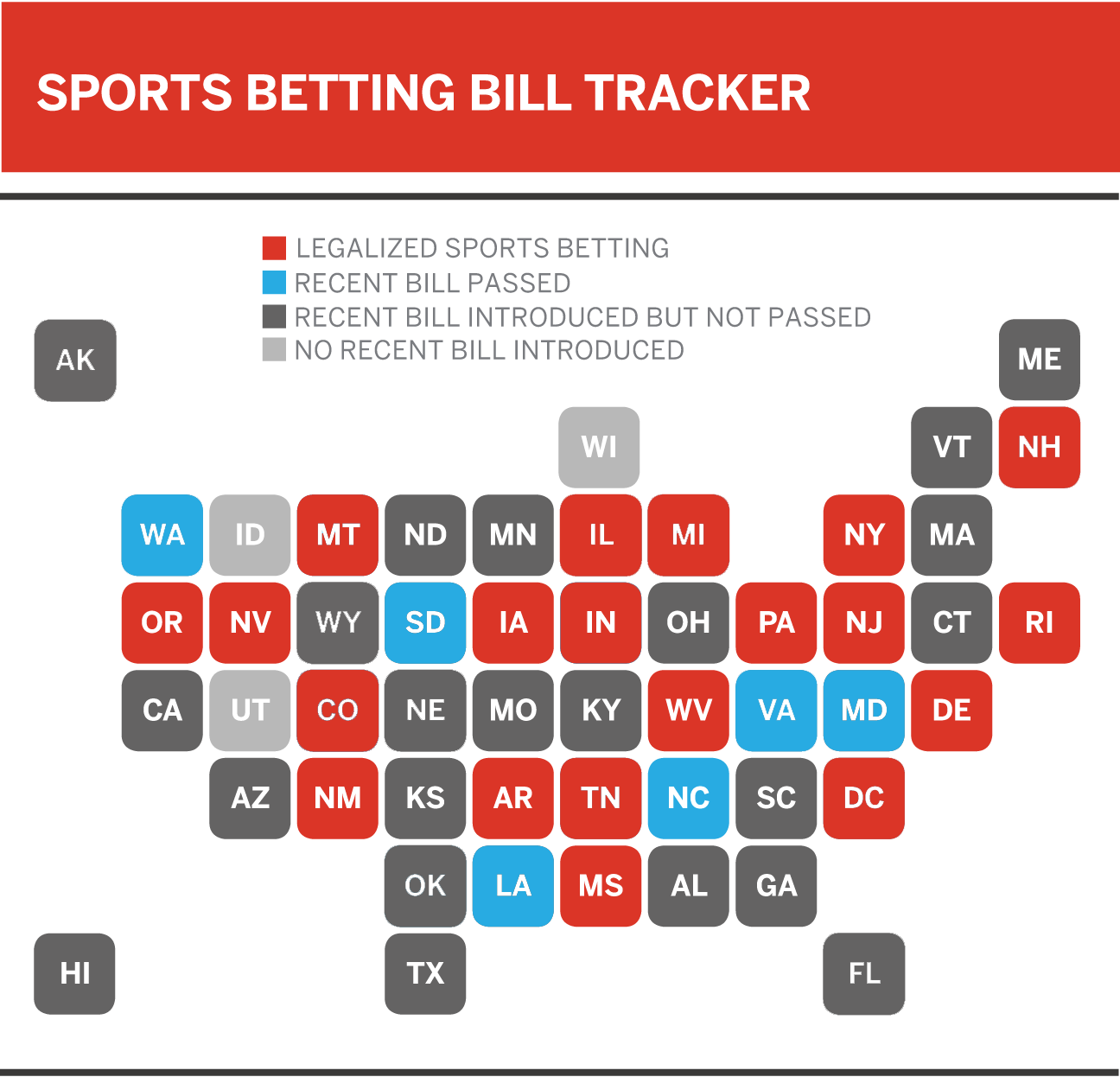States With Mobile Sports Betting
- What Are The States That Legalized Mobile Sports Betting? Today, 19 American states successfully legalized mobile sports betting. It includes Montana, New York, New Jersey, New Hampshire, Nevada, and Oregon. Moreover, Washington, Tennessee, Virginia, and North Carolina have passed bills regarding this that are still in progress.
- New Hampshire joined the list of states with legalized sports betting on the second day of 2020. The state agreed to a six-year contract with DraftKings, so mobile sportsbooks can be utilized.
Sports betting has slowly spread across the country since a U.S. Supreme Court ruling opened the door to legalization outside Nevada in 2018.
Andrew Cuomo is backing the legalization of mobile sports betting in New York in a push to close the state’s $15 billion budget gap looming in this year’s state budget. Indiana, for example, has embraced the mobile sports betting trend from day one and has seen immediate growth, capturing market share and meaningful revenue dollars. Sports betting on mobile accounted for nearly 86% of all wagers placed in the state in December, when the sports betting handle hit a record $313.1 million.

Yet the one aspect of sports betting that is still limited is mobile. Fully mobile sports betting* is only available in six of 22 states that have regulations in place.
With the pandemic surging and casinos possibly headed toward another shutdown, cash-strapped states are feeling the urgency to change that with the hopes a new revenue source could give state economies a much-needed lift.
The Big Apple Has Big (Sports Betting) Problems
At the forefront is New York, which was facing a $6 billion deficitbefore the financial devastation caused by the pandemic.

New York has legalized sports betting but only allows it at the four upstate casinos. That means the Empire State is losing business to neighboring New Jersey, the nation’s leader in mobile wagering.
According to research firm Eilers & Krejcik Gaming, New Yorkers placed approximately $837 million worth of bets in New Jersey in 2019
Another report from the same firm last February stated New York was losing approximately $200 million a year by not legalizing online sports betting. It’s worth remembering 85% of bets placed in New Jersey were online in 2019.
State Senator Joseph Addabbo Jr. wants to keep New York mobile betting in the state. It won’t happen this year, however.
The state hit hardest by the pandemic won’t have mobile betting in 2020 for two reasons: opposition from Gov. Andrew Cuomo, and the fact the legislative session is over.

That said, New York Sen. Joseph Addabbo is far from the only one viewing online sports betting as a coronavirus elixir.
Mobile Sports Betting To The Rescue?
The pandemic has crushed all sectors of the economy – except for one, it appears.
The power of online sports betting, which is expected to be an $8 billion market by 2025, has been visible through the prism of table tennis.
Indiana brought in $74 million from online sports betting in March without the NCAA Tournament or an open retail sportsbook. Table tennis reportedly drew 50% of the action at one book.
In addition, Colorado went live with sports betting in May and raked in $25.6 million in the first month despite casinos being closed and pro sports almost completely shuttered. Table tennis represented more than 25% of the Rocky Mountain State’s entire sports betting handle in its first month offering legal sports betting.
Indiana and Colorado experienced solid results with a thin slate of events to bet on. Those states should be in for an explosion of revenue with the return of pro sports (MLB is scheduled to restart on July 23 and the NBA is slated to follow on July 30).

What about the rest of the country?
Lay Of (The Mobile) Land
Numerous other areas either already have mobile betting in place, or have been forced to turn to it as an option due to COVID-19.
Washington, D.C. is a prime example. The nation’s capital rolled out a soft launch of its sports betting platform in June after delays with in-person sports betting.
D.C. was scheduled to go live with in-person sports betting last fall, but a lawsuit delayed that plan. Then, the pandemic hit and now the D.C. lottery will not offer in-person sports betting until the Summer of 2021.
Meanwhile, Illinois, which is facing a $2.7 million deficit, launched online sports betting in mid-June after its governor temporarily lifted restrictions.
What’s more, Michigan and Virginia are projected to launch online sports betting this fall, ahead of their original schedules. Michigan’s three casinos in Detroit all reported around 40% revenue drop-offs year-to-date compared to last year.
Tennessee, on the other hand, is a case unto itself. The Volunteer State is on track to become the nation’s first mobile-only sports betting market this September.
New York Has Company
As for California, the nation’s most populous state is in the same boat as New York.
The Golden State is facing a $54 billion deficit and was hoping sports betting was part of the solution.
However, a bill that would have legalized all forms of sports betting died in the legislature in late June due to tribal casino resistance.
Sign Of The Times
Even Las Vegas has been forced to adjust due to the coronavirus pandemic.
Mobile wagering is legal in Sin City, but you have to deposit and withdraw at the sportsbook.
That is set to change after the Nevada Gaming Commission took steps to implement cashless gaming earlier this month.
Vegas casinos have staunchly opposed fully mobile sports betting in order to keep customers in their sportsbooks. The about-face came due to the public’s concern over handling cash in the midst of a pandemic.
The takeaway is this — it has taken a pandemic to open many states’ eyes to what has been obvious for years: mobile sports betting isn’t the future, it’s the present.
*the ability to place bets anywhere within the state, as opposed to only at sportsbooks.
ALBANY — Gov. Cuomo is finally willing to wager on mobile sports betting.
The governor, who has long pushed back against legalizing online sports betting, will make the revenue-generating measure a central part of his policy proposals to be laid out in next week’s State of the State address.
Cuomo’s gamble, which comes as neighboring New Jersey continues to dominate the online wagering market, is one part of the governor’s efforts to lessen the financial impacts of the COVID crisis.
© Provided by New York Daily News New York Governor Andrew CuomoNew York Governor Andrew Cuomo
“New York has the potential to be the largest sports wagering market in the United States, and by legalizing online sports betting we aim to keep millions of dollars in tax revenue here at home, which will only strengthen our ability to rebuild from the COVID-19 crisis,” Cuomo said in a statement.
The governor’s embrace of mobile sports betting comes as the coronavirus pandemic has ravaged New York’s finances and officials seek new ways to make up for a multibillion-dollar budget gap.
While Cuomo has repeatedly expressed reluctance about raising taxes before Washington decides whether to approve aid to states and localities, he first softened his stance on online sports betting last month.
“Are there other ways to get revenue? How about marijuana? How about sports betting?” the governor said during a December news conference.
Mobile sports betting could be quite the boon to the Empire State. In November, New Jersey recorded a sports betting handle of $931.6 million, outpacing even Nevada and breaking a previous one-month record.
New Jersey sports books brought in $50.6 million in revenue and the Garden State recorded $6.2 million of that in taxes.
A recent industry survey found that nearly 20% of New Jersey’s sports wagering revenue comes from New York residents who cross into the Garden State to place wagers.
“At a time when New York faces a historic budget deficit due to the COVID-19 pandemic, the current online sports wagering structure incentivizes a large segment of New York residents to travel out of state to make online sports wagers or continue to patronize black markets,” Cuomo said.
While the governor has argued in the past that a new constitutional amendment would be needed before online sports betting could be legalized, his proposal will require mobile sports operators to be licensed by the state and partnered with a licensed gaming facility.
It appears to mirror revamped legislation unveiled last year that would place the servers running the online operations at upstate casinos with currently approved physical sports books, which supporters say would be allowed under current gambling rules and regulations.
Under Cuomo’s proposal, the New York State Gaming Commission will issue a request for proposals to offer mobile sports wagering in the state.
States With Mobile Sports Betting Against
The commission will also expand existing integrity programs to ensure any entity operating mobile gaming apps implement all necessary safeguards against abuses and addiction.